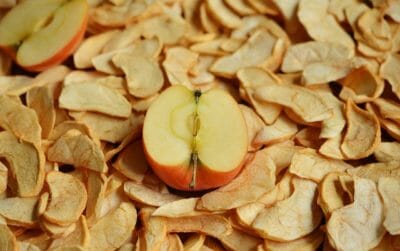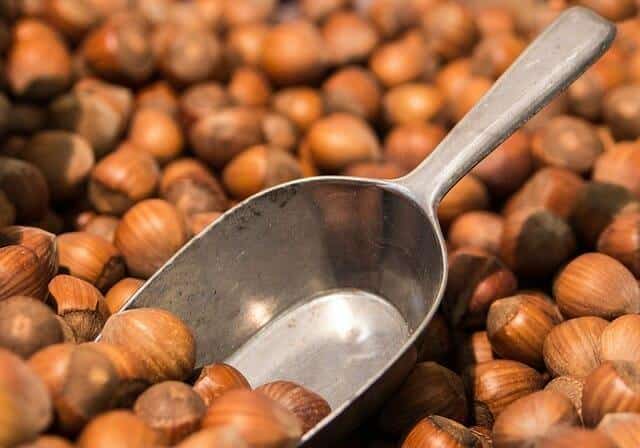There are many foods that store well, and many foods that are super-nutritious or have high caloric value, but the number of foods that store well and are especially nutrient- and calorie-rich are much fewer.
Calories without nutrients won’t satisfy your body, leading to continual hunger that will cause you to eat more calories than you need, while nutrients without calories will lead you to eat your food stores more quickly. The below foods offer a balance of these two considerations.
Also important, of course, is learning different storage techniques, such as dehydrating, fermenting, vacuum sealing, and canning. These are beyond the scope of this article, but are skills you’ll want to acquire to ensure these foods reach their full storage potential.
1. Nuts
Hazelnuts are among the most nutritious nuts in terms of balanced nutrition, and store quite well. They are high in vitamins E, K, B6 and folate. Other high-nutritious nuts include Brazil nuts (high in the all-important saturated fats, magnesium and selenium), cashews (a good source of carbs, zinc and iron), macadamia nuts (high calories in general especially fat), almonds (high protein, fiber, riboflavin, niacin, vitamin E and calcium), walnuts (high in fat and folate) pecans (also high in fat and very similar to walnuts), pistachios (high in potassium and vitamin B6) and chestnuts (high in carbs, fiber, vitamin C, folate, healthy fats, iron, calcium and manganese).
2. Seeds
Seeds are high in nutrients and are good sources of calories, including protein and fat. Good seeds include: chia (omegas, carbs, protein, fiber, antioxidants and calcium), hemp (good fats including omegas and high-quality protein), sunflower (vitamins E, B1 and B6, copper, manganese, selenium, magnesium, folate and niacin), pumpkin (magnesium, manganese, copper, zinc, protein and many others), sesame (manganese, calcium, phosphorus, magnesium, iron, zinc, vitamin B1, selenium and fiber).
3. Moringa powder
This powder is available at health food stores and is a great good source of bioavailable nutrients, including calcium, magnesium, iron, potassium, phosphorous, vitamins A, B1, B2, B3, C and E, in addition to protein.
Beet Powder: The Ancient Secret To Renewed Energy And Stamina
If you don’t feel like shelling out the money to buy the powder, then you also can find seeds online to buy and grow your own. If in a cold climate, you might even be able to get them to produce seed in one year if you start them indoors three months before the last frost. Hang them to dry, and crush them up or grind for storage.
4. Extra virgin coconut oil
Fat is crucial in survival situations, and coconut oil has a lot of high quality fat and, thus, calories. It can last at least 18 months if stored properly (don’t get the non-extra virgin stuff for long-term storage, as it won’t last as long), and can be used in many of the same ways as butter.
5. Dried fruit
 Fruits are high in sugar, which means high calorie content. Especially good are high-nutrition superfood berries like goji berries, raspberries, blackberries, mulberries and currants, which are all generally high in vitamins, including vitamins C, K, A and folate. Also excellent are cherries (good for vitamin A and many health promoting compounds), mango (very high in sugar, vitamins A, B6, C and E, copper, and potassium), banana (vitamins C and B6, niacin, riboflavin, and thiamin, plus sugar), grapes (raisins, which are high in sugar, B vitamins, iron and potassium), and many others.
Fruits are high in sugar, which means high calorie content. Especially good are high-nutrition superfood berries like goji berries, raspberries, blackberries, mulberries and currants, which are all generally high in vitamins, including vitamins C, K, A and folate. Also excellent are cherries (good for vitamin A and many health promoting compounds), mango (very high in sugar, vitamins A, B6, C and E, copper, and potassium), banana (vitamins C and B6, niacin, riboflavin, and thiamin, plus sugar), grapes (raisins, which are high in sugar, B vitamins, iron and potassium), and many others.
6. Grains
Brown rice, wild rice and quinoa are among the most nutritious, and most can be stored for many years if stored properly. Grains are a good source of carbs, and most contain a lot of magnesium, B vitamins, iron, phosphorus, selenium and manganese. Grains combine well with legumes (see below) to create full proteins.
7. Legumes
Dried beans, peas and lentils all can be stored for many years and are good sources of protein, carbs, fiber and many minerals and vitamins.
8. Honey
Honey is packed full of nutrition and keeps very well, for decades or even centuries. It also can be used to preserve other foods. It’s high in calories and sugar, but is also quite high in vitamin B6, thiamin, niacin, pantothenic acid, iron, riboflavin, amino acids, calcium, copper, magnesium and many other nutrients.
9. Unwashed free-range farm eggs
Eggs, if left unwashed, contain a bio-film that helps to preserve them much longer. They can last up to three months out of the fridge and a year or more if refrigerated. Free-range eggs are higher in nutrients than caged chicken eggs, and also are high in vitamins A and E, omega-3 fatty acids, protein, fat and iron.
What foods would you add to our list? Share your suggestions in the section below:
 Off The Grid News Better Ideas For Off The Grid Living
Off The Grid News Better Ideas For Off The Grid Living




